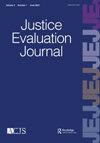Advancing “What Works” in Justice: Past, Present, and Future Work of Federal Justice Research Agencies
IF 0.7
Q3 CRIMINOLOGY & PENOLOGY
引用次数: 5
Abstract
Abstract Since the 1960s, research on crime, delinquency, and justice has achieved important milestones regarding program evaluation. The field has made significant strides in identifying and cataloging evidence-based programs, practices, and policies for juvenile and criminal justice. These efforts have helped refine our definition of “evidence-based programs.” Tracing the distinctive role that Federal science agencies have played in determining what works and in advancing evidence-based approaches to crime and justice, we highlight key milestones, distinctive features, and the changing landscape of justice research over the past half-century. We extend our examination of current efforts to discern future directions for evaluation and evidence work in our field. Our review of a half-century of justice evaluation to build evidence-based approaches in juvenile and criminal justice reveals an evolution in our field’s commitment to rigor, our standards of evidence, and our notions of “what works.” Our review suggests important directions for the future including the importance of program context, the trade-offs between implementation fidelity and experimentation, and the added value of supporting programs with decision-making tools and platforms. We close with some insights into how current approaches to evaluation may further evolve and grow, especially in the areas of implementation, program adaptation, and support for local capacity. The payoff is a deeper understanding of the potential and the limitations of evaluation evidence to determine what works and what doesn’t.推进司法“有效”:联邦司法研究机构的过去、现在和未来工作
自20世纪60年代以来,关于犯罪、犯罪和司法的研究在项目评估方面取得了重要的里程碑式进展。该领域在识别和编目以证据为基础的青少年和刑事司法项目、实践和政策方面取得了重大进展。这些努力有助于完善我们对“循证项目”的定义。追踪联邦科学机构在确定有效方法和推进基于证据的犯罪和司法方法方面发挥的独特作用,我们强调了过去半个世纪中司法研究的关键里程碑、独特特征和不断变化的景观。我们扩展了对当前努力的审查,以辨别本领域评估和证据工作的未来方向。我们回顾了半个世纪以来为在少年和刑事司法中建立循证方法而进行的司法评估,揭示了我们这一领域对严谨性的承诺、我们的证据标准以及我们对“什么有效”的概念的演变。我们的综述提出了未来的重要方向,包括项目背景的重要性,实施保真度和实验之间的权衡,以及用决策工具和平台支持项目的附加价值。最后,我们对当前的评估方法如何进一步发展和发展提出了一些见解,特别是在实施、项目调整和支持地方能力方面。回报是更深入地了解评估证据的潜力和局限性,以确定哪些有效,哪些无效。
本文章由计算机程序翻译,如有差异,请以英文原文为准。
求助全文
约1分钟内获得全文
求助全文

 求助内容:
求助内容: 应助结果提醒方式:
应助结果提醒方式:


